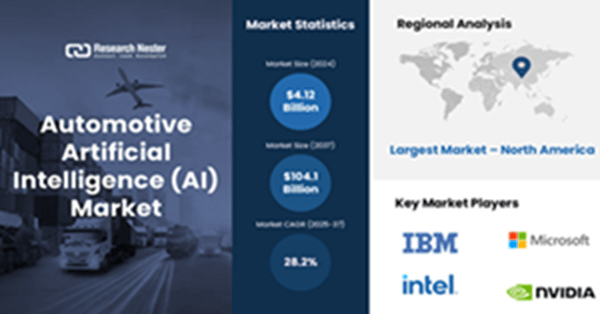It has been estimated that almost 81.5% of automotive enterprises surveyed have actively explored or deployed Artificial Intelligence. Also, 73.5% of automotive enterprises surveyed have accelerated Artificial Intelligence in the past two years.
The rising popularity of AI in the field of automation offers numerous lucrative opportunities for growth to the market players. Research Nester predicts that the automotive AI market size will reach USD 4 billion by the end of 2024. Furthermore, by 2037, the market is anticipated to garner USD 80 billion. In this blog, we will explore some of the latest trends in the market and other prospects.
What are today’s consumers expecting in their cars?
Predictive maintenance: Almost, 47.3% of global manufacturing has implemented predictive technologies to eradicate operational costs. Practically, predictive maintenance has enhanced downtime by 85.4% and maintenance staff productivity by 55.4%. Some of the benefits of predictive maintenance are:
- Prolonged vehicle lifespan
- Less downtime and costs
- Increased safety
- Data-driven decisions
Behavior prediction: Behavior prediction is a prominent component of autonomous vehicle systems, enabling safe navigation in a dynamic environment. It also helps in anticipating the behavior of other traffic agents.
AI-enabled Voice recognition: According to an estimation, about 125 million people in the United States, drivers use voice control technology. Car manufacturers are turning to voice Artificial Technology to improve the safety, vehicle performance, and driving experience.
Smart energy management system: Artificial Intelligence powered systems in electric cars help use cars efficiently. The introduction of AI is revolutionizing the way users are managing fuel consumption. The AI features can identify cost-saving opportunities and manage fuel judiciously. Some of the benefits of the are as follows:
- Streamlines the fuel purchasing process with the help of predictive analytics
- Ensures optimization of fuel efficacy
- Robusting fuel fraud detection
- Enhance fuel quality monitoring
- Vigilant about environmental compliance
Artificial Intelligence is crucial in developing autonomous vehicles, potentially reducing GHG or greenhouse gases by up to 34.3% by 2050.
Some of the practical use cases where AI has been deployed by leading companies are as follows:
- Tesla
With the deployment of an Artificial Intelligence algorithm, Tesla’s autopilot system can analyze data in real-time, allowing the vehicle to make informed decisions based on changing road conditions.
- BMW
BMW has embraced Artificial Intelligence in the entire value chain, rendering enhanced value for customers, employees, products, and processes. According to the company’s website, BMW Group currently utilizes artificial intelligence in more than 400 applications and many relevant areas of the company.
- Bosch
Bosch has adopted Artificial Intelligence technology most efficiently. Over the next decade, the company aims to utilize Artificial Intelligence in various services and products. A car with an onboard AI computer will accumulate new data about factors such as road conditions, surrounding traffic, congestion, etc.
Apart from this, automotive AI companies are giving astounding technological services to consumers. These companies are turning cars into a supercomputer on wheels. Some of these are listed below:
- MaplessAI
The company has developed AI-driven solutions for remote car operations and enables autonomous vehicle control from a centralized operation. For instance, Mapless technology enables full operational remote control of existing fleet vehicles from hundreds of miles away.
The technology also renders low-latency connectivity between fleet vehicles and operators. The company has a fleet of over 4,100 vehicles and annual revenues exceeding USD 60 million.
- LoopX
The company’s Operation Awareness System utilizes machine vision with the capability of data mining to find people, vehicles such as trucks and loaders, and buildings. Also, an advanced driver assistance system offers detection of situations such as crossover of pedestrians.
- Ambro
The technology is capable of detecting vehicle damage and giving precise cost estimations filed directly with the insurance company. Some of the features of the technology are as follows:
- Parts and damage detection
- Text scanning
- Fraud detection
- Image recognition directly through the application
- Claim cost estimation
- Real-time claim assistance
- Strada routing
The company is building AI systems to automate load bundling and bidding for truck shipments. The technology can cut down on waiting time and ensure drivers are paid well on time. Also, it lowers the rate for shippers while making sure carriers’ fleets are used to complete capacity. The work is done mainly in 4 steps: Understanding the needs, analyzing the environment, bundling optimal routes, and returning the directions.
Wrapping up,
It is quite evident that the market holds a vast pool of opportunities and there are multitudinous aspects to dive in. However, new as well as old market players are required to understand the market intricacies to excel in the cutthroat competition.
Availing an exhaustive market research report is an efficacious tool for getting information about constantly changing market dynamics. Factors such as regional growth analysis, market growth drivers, etc. help make judicious decisions.
Source: https://www.researchnester.com/reports/artificial-intelligence-in-automotive-market/1970




























